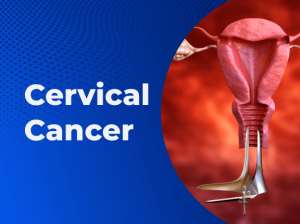
January is Cervical Health Awareness month. Most Cervical Cancer is caused by persistent infection with viruses called High Risk Human Papilloma viruses (HPV) which is sexually transmitted. Cervical Cancer is the fourth most common cancer in women worldwide, and each year, about 604, 000 new cases occur. In 2020 there were 342 000 deaths, with a WOMAN DYING OF CERVICAL CANCER EVERY 2 MINUTES. About 90% of the new cases and deaths occur in low- and middle-income countries. The disparity in incidence of Cervical Cancer between higher resource countries and those in Africa like Ghana, lies in their high national prioritization, funding and implementation of national health policies, and the determination to decrease or eliminate it through Education, Screening and Vaccination. These countries have been implementing these measures for years and it has paid off. Australia claims elimination of Cervical Cancer in 2035 and Canada’s aim is for 2040.
Cervical cancer takes years for affected cells of the cervix to turn cancerous; therefore, this gives us time to prevent the incidence by identifying precancer cells and treating them in the early stages.
In November 2020, the WHO launched the “Global Strategy to accelerate the elimination of Cervical Cancer” using these targets:
- 90% of girls fully vaccinated by the age of 15 years.
- 70% of women screened by the age of 35 to 45 years.
- 90% treatment of precancerous lesions and management of 90% of invasive cancer cases.
RESPONSIBILITY OF GOVERNMENTS
It is estimated that every year 2,797 women are diagnosed with cervical cancer and 1,699 die from the disease in Ghana. It is the second leading cause of cancer in women in Ghana after breast cancer. These numbers can be reduced with screening and treatment of Precancerous lesions. What actions should governments in Africa take?
1.Educating the society (both women and men) about the disease
2.Screening of women should be year-round engagement.
3.Making Pre Cervical cancer screening part of the training course for midwives and nurses.
4.Use of mid-level health providers (nurses, midwives and community health workers) in the community setting or CHPS Compounds 5.Use of mobile devices and other methods for screening/treatment of precancerous lesions.
6.Reaching out to the vulnerable in our towns and villages who should pay very minimal or be screened for free.
PRIVATE INITIATIVES- THE BATTOR STORY
In Ghana the “Cervical Cancer Prevention and Training Center (CCPTC) at The Catholic Hospital at Battor under the able leadership of Dr. Kofi Effah has demonstrated that low-cost methods can work in limited resource countries. The center was established in 2017 and as of end of 2022, 302 health care workers from all 16 regions of Ghana covering 116 districts out of 216, with 3 others from West Africa have been trained. The many trained mid-level health professionals from CCPTC are screening women all over Ghana and I applaud the center and the able team working to do this. The Ghana Health Service could “take a cue from their page” and help Ghana be one of the first African countries to reach the WHO goal of “90-70-90 targets by 2030 to get on the path to eliminate cervical cancer within the next century”.
INDIVIDUAL PERSONAL RESPONSIBILITY
Our government has a responsibility and we as individuals do as well. These include:
- -Women getting Screened and Vaccinated (up to the age of 45 years)
- -Parents getting your children, both female and male vaccinated where it is available.
- -Men encourage the women in your life to be screened and vaccinated.
- -Avoid high risk sexual behaviour.
- -Quit Smoking if you do smoke.
- -Avoid exposure to HIV/HPV e.g.use Condom
- -Avoid multiple sexual partners.
- -Let us lobby our politicians to make reduction/elimination of cervical cancer a Public Health priority.
Please share on your social media platforms
Dr. Barbara Entsuah - Family Medicine
#Loveyourbody# ❤️❤️❤️❤️
(Physician, Author, Speaker)
Webpage: www.Barbaraentsuah.com
Latest Book: “A Woman’s Guide to Her Body and Her Total Body”.




 Akufo-Addo commissions Phase II of Kaleo solar power plant
Akufo-Addo commissions Phase II of Kaleo solar power plant
 NDC panics over Bawumia’s visit to Pope Francis
NDC panics over Bawumia’s visit to Pope Francis
 EC blasts Mahama over “false” claims on recruitment of Returning Officers
EC blasts Mahama over “false” claims on recruitment of Returning Officers
 Lands Minister gives ultimatum to Future Global Resources to revamp Prestea/Bogo...
Lands Minister gives ultimatum to Future Global Resources to revamp Prestea/Bogo...
 Wa Naa appeals to Akufo-Addo to audit state lands in Wa
Wa Naa appeals to Akufo-Addo to audit state lands in Wa
 Prof Opoku-Agyemang misunderstood Bawumia’s ‘driver mate’ analogy – Miracles Abo...
Prof Opoku-Agyemang misunderstood Bawumia’s ‘driver mate’ analogy – Miracles Abo...
 EU confident Ghana will not sign Anti-LGBTQI Bill
EU confident Ghana will not sign Anti-LGBTQI Bill
 Suspend implementation of Planting for Food and Jobs for 2024 - Stakeholders
Suspend implementation of Planting for Food and Jobs for 2024 - Stakeholders
 Tema West Municipal Assembly gets Ghana's First Female Aircraft Marshaller as ne...
Tema West Municipal Assembly gets Ghana's First Female Aircraft Marshaller as ne...
 Dumsor is affecting us double, release timetable – Disability Federation to ECG
Dumsor is affecting us double, release timetable – Disability Federation to ECG
